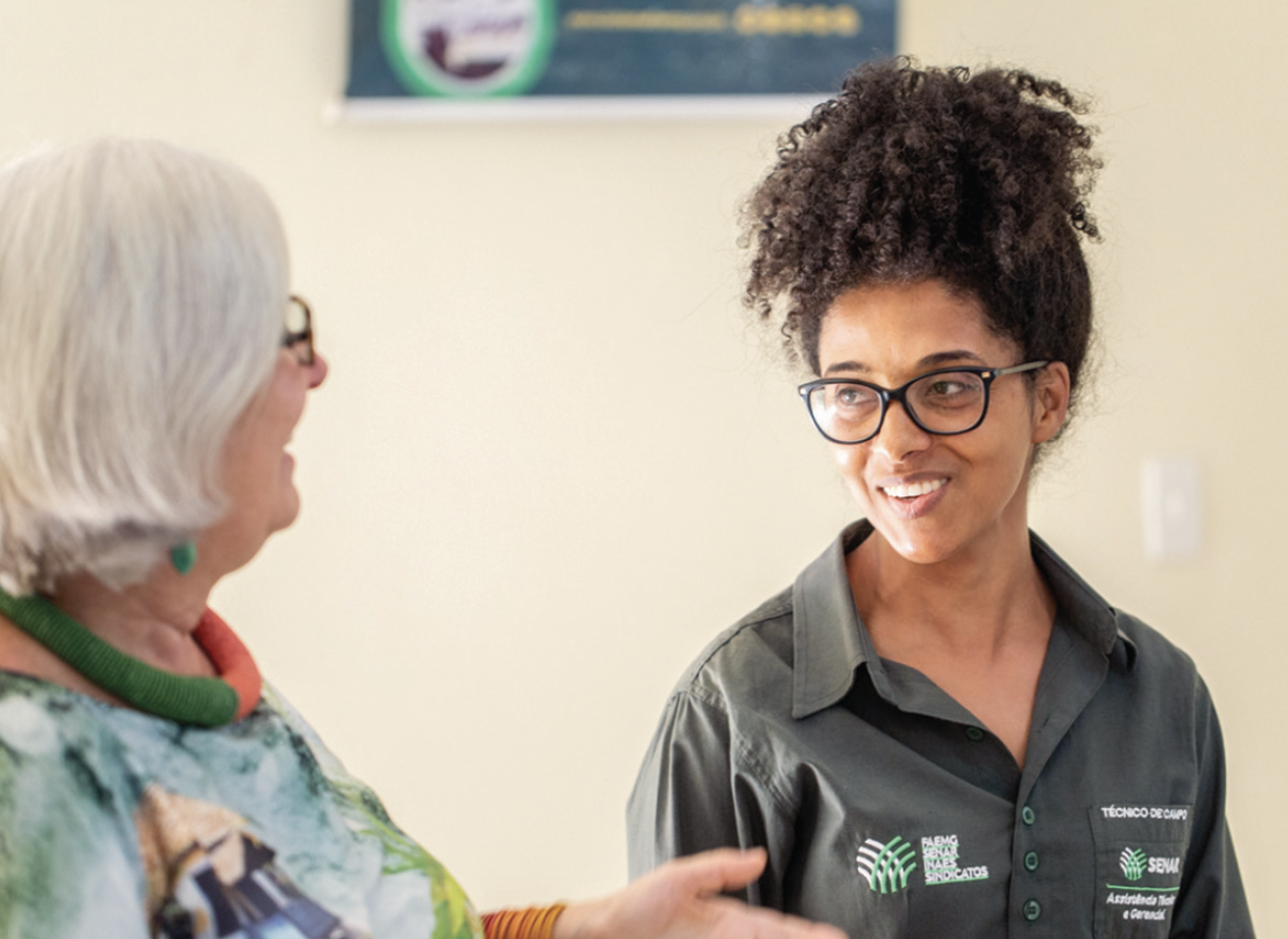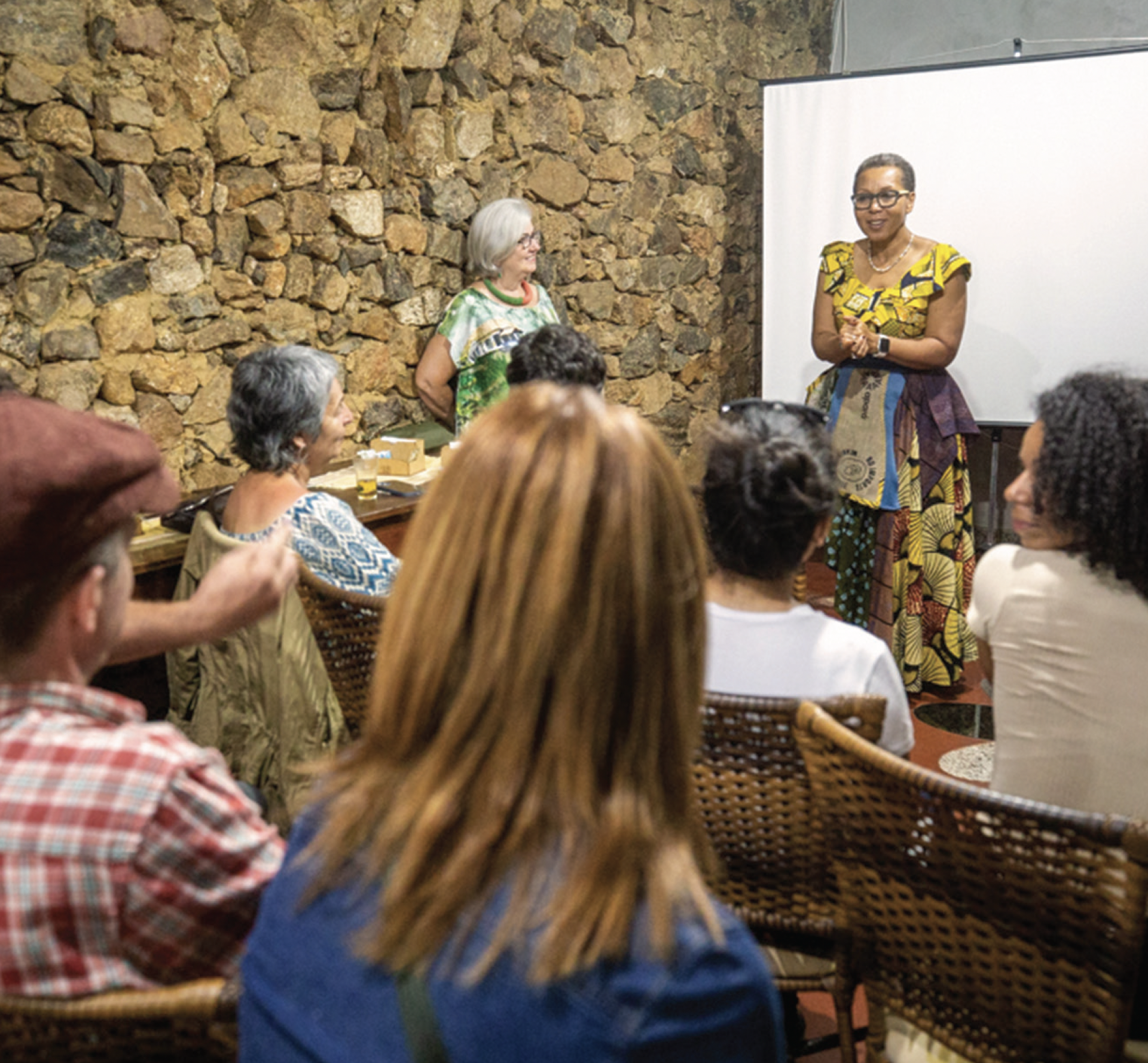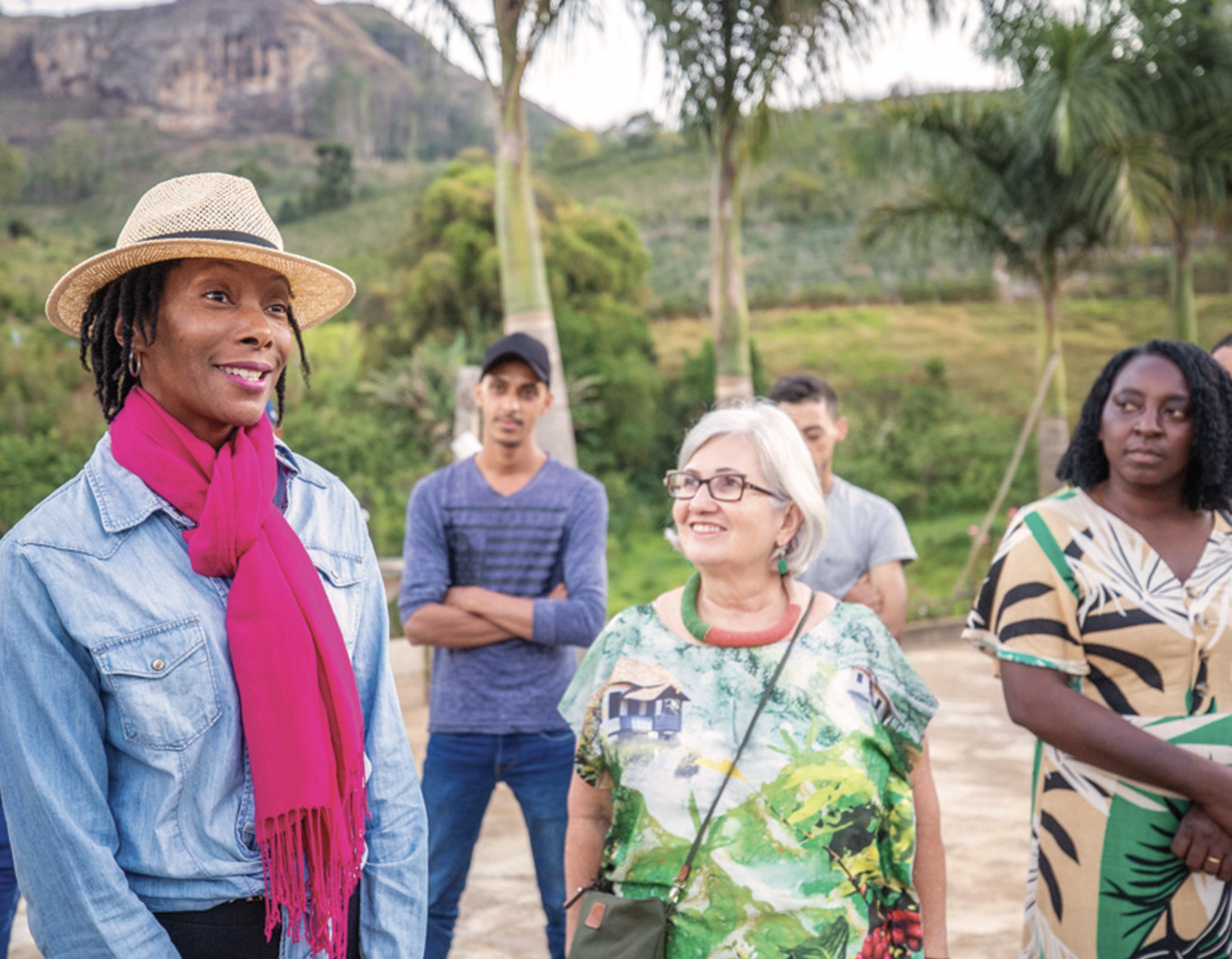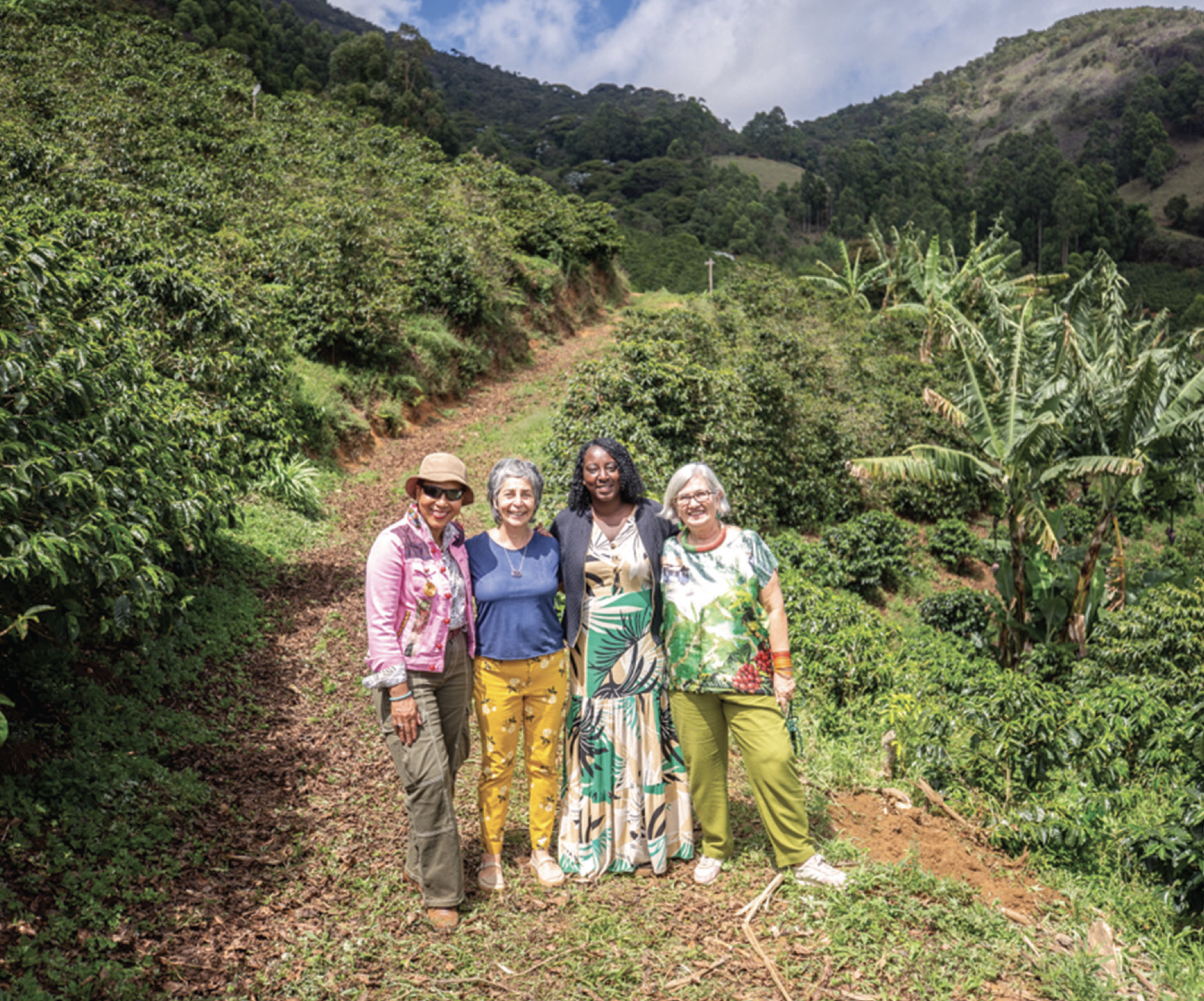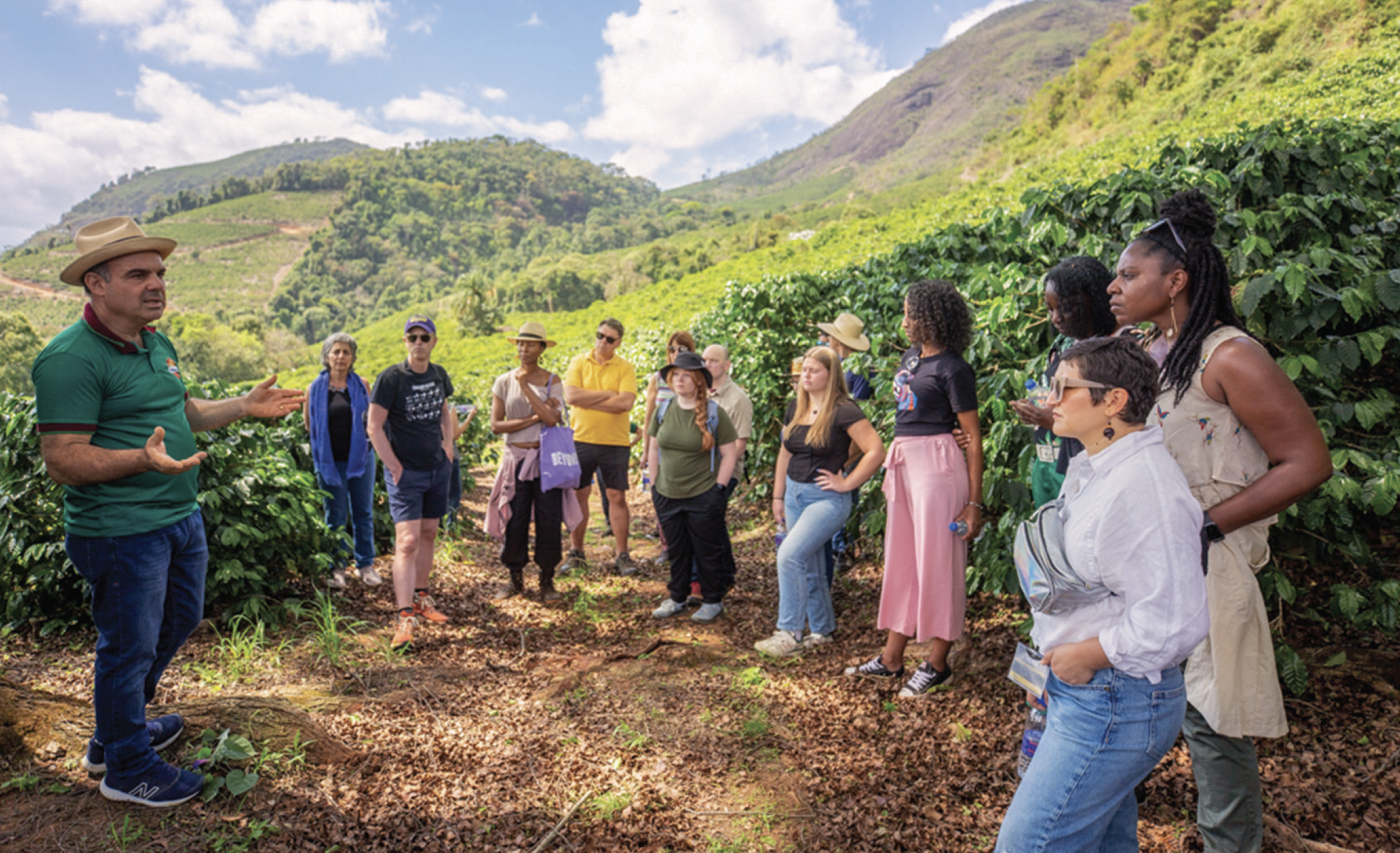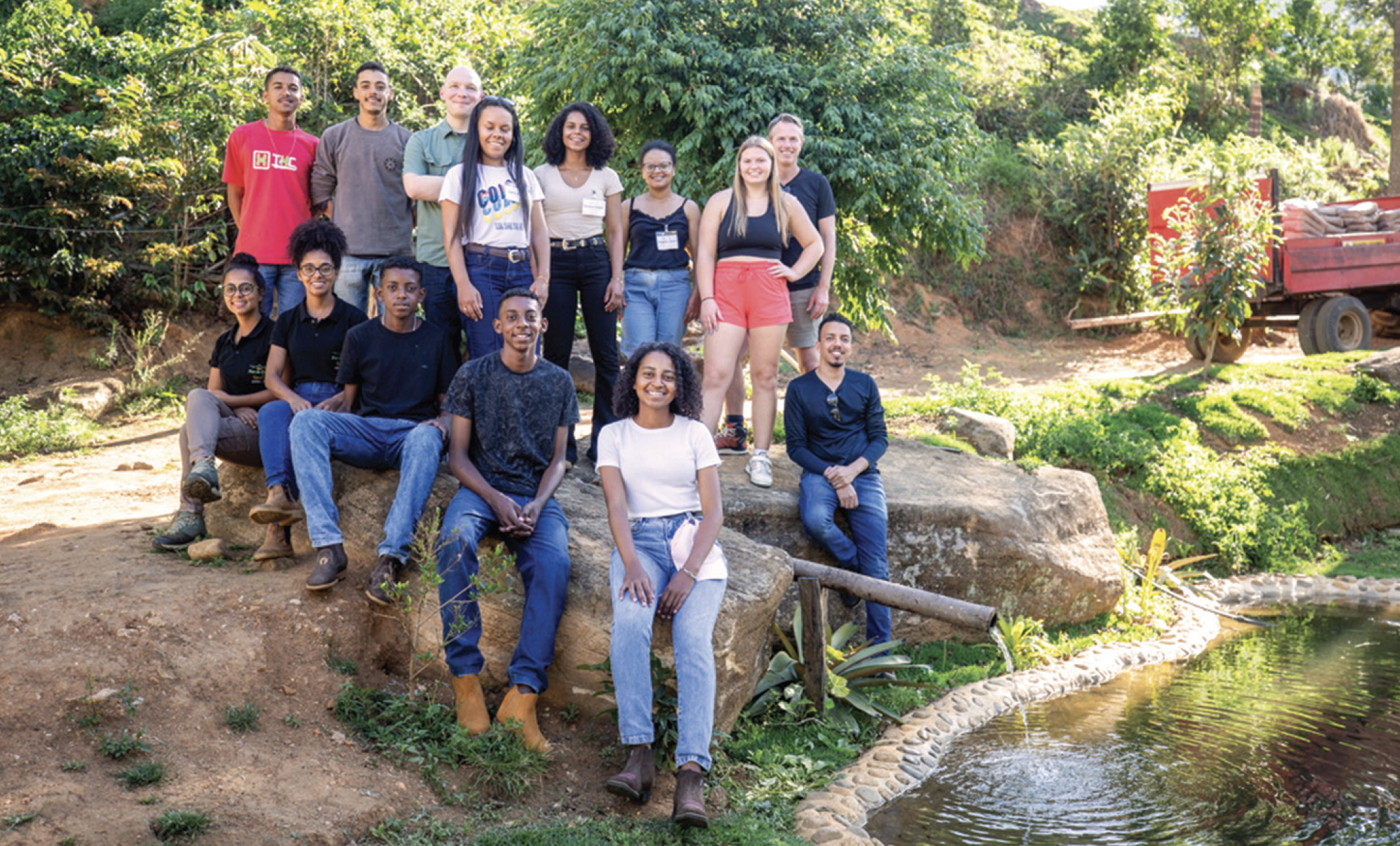Black Mattering in Specialty Coffee: Insights From a Black Producer Program Origin Trip to Brazil
By Tiffany D. Johnson | Photos by Felipe Abreu
Pictured above: Georgina Jarrett, Areli Barrera Grodski and Tiffany D. Johnson (left to right) on the Cotrim & D’Alessandro farm.
When I was a little girl, my maternal grandmother, Geneva Love, would lovingly prepare a table of coffee and snacks for my mom and my three aunties. Almost as important a ritual as our monthly communion (almost), my mom and my aunties would file into Gramma Jenny’s house and gather around her table after work. They would hold the warm cups of coffee in their hands and share stories about all the things that grown Black women in the United States discussed in the early 1990s. The children were not allowed at that table, and we were not allowed to drink the coffee that sat in the mugs. (They told us it would stunt our growth, and that we wouldn’t like it anyway.)
Over time, I would drink coffee as a college student, as a barista, as a faculty member on the tenure track, and during breakfasts and gatherings with my own sister-friends. I would begin to wonder what was in that cup, about the work and the workers that helped it get to our table. Today, I have the privilege of studying, learning and teaching about equity and wellness for workers throughout the coffee industry and beyond.
Neide Peixoto, Phyllis Johnson and Miriam Aguiar (front row, left to right) with Black Producer Program origin trip participants at Serras das Cabeças in Brazil.
While I can only imagine what my mom, aunties and grandma discussed at that coffee table, I can now—with my own experiences of being a Black woman in the workplace—understand why that ritual was so cherished. A recent coffee origin trip to Minas Gerais, Brazil, sparked memories of that table, and further insight into this ritual of gathering and storytelling.
In September 2023, alongside 19 others working in and around specialty coffee from the United States, the United Kingdom, and Brazil, I had a seat at the proverbial coffee table that my childhood dreams were made of. While riding through hundreds of miles of beautiful countryside, the image of the table resurfaced, and I remembered this idea of black mattering—an indisputable sense of being valuable, worthy, fully human—that deeply resonated with me when I read Kevin Quashie’s 2021 book Black Aliveness, or a Poetics of Being. I felt it, and I began to wonder if it was at least part of what drew my mom, aunties and grandma to that coffee table; to that place where they could see each other through and beyond the florescent lights hovering over it.
(Left) Josiane Cotrim and Cristiene Aparecida Martins at a labor organizing meeting at the Rural Producer’s Union Facility in the Matas de Minas growing region.
(Right) Black Producer Program co-founder Phyllis Johnson speaks at a meeting where buyers presented themselves to producers for the first time.
About The Black Producer Program
The trip to Minas Gerais was organized by the founders of the Black Producer Program—Phyllis Johnson and Miriam Aguiar, along with the founder of the International Women’s Coffee Alliance (IWCA) Brazil chapter, Josiane Cotrim—who conceived of the program back in 2014. As Johnson, co-owner of BD Imports and founder of Coffee Coalition for Racial Equity (CCRE), explains it, “We started trying to answer a question, and that question was, ‘Where are the Black Brazilian coffee farmers?’ And I say that with a lot of humility because I’m Black American, but I feel like we have a lot of the same history and understanding. My own history, my own past helped me to have some level of empathy for theirs.”
Imprints of Brazil’s unique history of racism are felt today in many sectors of coffee, including farming. To this point, Johnson notes that “while challenges faced by Black producers are not unique to other small-scale producers, such as the lack of financing, climate change, or securing a premium market, challenges are compounded by generations of racist policies and a lack of opportunities that show up in the numbers and lack of participation on a global scale.” Devaluation of Black Brazilian coffee producers is especially acute. To be sure, even though the expansion of coffee and other agricultural goods is largely due to the transatlantic slave trade and subsequent use of free labor by enslaved Afro-Brazilians, the amount of ownership of agricultural establishments, including land such as coffee farms, by Black Brazilians (the descendants of said laborers) is low at 8.4 percent. This low percentage—in addition to laws such as Lei De Terras de 1850 (Land Act of 1850) that limited access to land ownership by Black Brazilians—suggests that Black Brazilian agricultural workers (broadly) and Black Brazilian coffee producers (specifically) are deeply under-valued and devalued, despite the immense value their labor has brought to the country’s economy.
Planting coffee trees on the first day of spring at Serras das Cabeças.
Johnson’s curiosity planted a seed that is now a collaborative program addressing value and quality perceptions of Black producers in Brazil. Johnson and Aguiar started exporting and importing coffee from Black Brazilian coffee producers into the U.S. in 2020, garnering Brazilian media attention for developing the first program of its kind. Johnson also shares that the program “provides an opportunity for Black Brazilian coffee producers to directly engage with the global specialty coffee trade, providing transparency and higher premiums for quality coffees.”
Aguiar—who founded the exporting and roasting company Apará Cafés Especiais—shares her perspectives on the program, noting that while Black people make up more than half the population in Brazil, and are present in many sectors and at coffee fairs and across the coffee value chain, they are still “invisible.”
“This project brought us a lot of awareness about our history … [which led me to think] about my own history and my beginnings in business and in coffee, and especially when I created Apará Cafés Especiais,” Aguiar says. “My purpose was to create an impactful business that brought much more than [the] coffee you know, revealing everything that is behind a cup of coffee.”
Since 2014, the program has grown in both the number of producers and volume of coffee exported—from one family in 2014 to more than 10 families in 2023—while expanding its national and global list of coffee roasters who are becoming more knowledgeable about equity in supply chains. In 2022, with tremendous assistance from Cotrim, Johnson and Aguiar began organizing trips to Brazil to further build connection between roasters in the U.S. and U.K. and Black Brazilian producers.
(Left) Georgina Jarret, a coffee educator and CCRE education committee chair, tells her story as Josiane Cotrim translates and others listen on the Armindo coffee farm.
(Right) Phyllis Johnson, Miriam Aguiar, Neide Peixoto and Josiane Cotrim (left to right) at Sitio Pico do Boné.
Origin Trips, Origin Stories
Origin trips typically offer opportunities for buyers and producers to connect, and for producers to share their stories with the buyers. I also understand traditional origin trips to be opportunities for buyers to tour the land, inspect the plants, ask questions about growing and harvesting processes, cup coffees and perform sensory analysis, and make assessments about the ways in which the producers’ processes reflect the value the buyers pay for and communicate to their customers. As an organizer of the Black Producer Program origin trip, Johnson felt uncomfortable with this tradition, which she and Aguiar followed during the first Black Producer Program buyers’ trip to Brazil. She felt compelled by the possibility that this seemingly innocent tradition reflected a power imbalance that perpetuated inequity and devaluation.
“It felt normal, until it didn’t,” says Johnson. “I questioned why, after our first trip, we didn’t consider the need for the producers to know more than the buyer’s names and what companies they represented. As I considered what seemed to be a natural way of thinking more deeply, was this one simple and overlooked power dynamic that needed to shift? I thought about all the times I’ve visited farmers in my career and how seldom adequate time was spent on sharing on the part of the visitors. It seemed that we always assumed that the producer’s assumptions about the buyers would suffice. We may have intuitively thought that it was fine for the producers to unknowingly qualify the buyers as being ‘worthy’ of their offerings knowing little to nothing about them. It was fine for the producers to assume who their buyers were while sharing their stories about their land, personal history, processing techniques and desire to build sustainable and long-term relationships with committed buyers. It was on them to sell themselves to us—the visitors, the buyers.”
So, on this trip, Johnson, Aguiar and Cotrim shared photos and other information about the buyers with the producers before the trip even began. They also requested that the buyers present themselves, their histories, their missions and their motivations to the producers while on the trip. Months later, as I reflect on the trip, this invitation sticks out to me as the glue that facilitated more connection between producers and buyers. As I considered why this may have been consequential for connection, I was reminded of this quote from artist, activist and academic Lilla Watson: “If you have come here to help me, you are wasting your time. But if you have come because your liberation is bound up with mine, then let us work together.” If we believe our freedom is bound up with others’ freedom, then if one actor in the chain isn’t free, no one is, regardless of economic status. Otherwise stated, everyone in the chain is bound up by something.
(Left) On Cotrim & D’Alessandro farm, trip participants listen to Sergio Cotrim D’Alessandro explain information about coffee on the land.
(Right) The next generation of coffee producers meets a next-generation coffee roaster at Pico do Boné farm.
In a way, the Black Producer Program’s origin trip invited participants to see the ways we all may be bound up by perceptions of value about ourselves, our work, and the work of others. It showed me that a more balanced approach to storytelling (in which buyers and educators and any other visitors make themselves vulnerable enough to be witnessed, thus evaluated) may help us to more accurately and equitably evaluate ourselves and the people we work alongside.
In the 2022 book How to Tell a Story: The Essential Guide to Storytelling from the Moth—published by the nonprofit storytelling organization The Moth—the authors write, “Stories are the currency of community. They tear down walls, unite cultures, and help people realize they are more alike than different, all while celebrating what is unique to you.” What if the stories we tell at origin are backstories that can break us out of a rut of business-as-usual approaches, and help us notice and fortify different streams toward sustainability, equity and freedom? While I am not naive enough to believe that balanced storytelling at origin is the only practice that can lead to collective liberation, after this experience I do believe that it may be an essential pathway.
A New {Value} World: Re-imagining Value Through Stories
The terms value and values have been defined, shaped and used in various ways. Professor and researcher Edward “Ted” Fischer, across various insightful articles as well as his book Making Better Coffee: How Maya Farmers and Third Wave Tastemakers Create Value, helps us to understand that values are ideas and ideals about how the world should be and how one should act in it. Values, he suggests, point us to not only what is important, worthy, good or virtuous, but also to what is not. For example, in today’s specialty coffee industry, value can be signaled by a cupping score of 86 or higher, by elevation metrics, information about varieties and more. Once these ideals have a critical mass of believers—individuals and institutions that legitimate them via discourse and practices—a “value world” has been created. Such worlds give our human brains simplified frameworks to understand what is good, worthy and moral. Furthermore, these worlds support the extent to which we engage in financial exchanges and relationships. Otherwise stated, we invest our money, time, attention and care in what and whom we believe to be important and worthy.
The group walks through Serras das Cabeças farm.
While often subconscious, these perceptions of value impact most of us, especially when it comes to our work. The Black Producer Program invited its origin trip participants to engage in a coffee value world where every actor—not only the producers—acknowledged and told their origin stories (their why, their values).
When I learned that I would be telling my story on the trip, I felt a knot in my throat and a tightening in my stomach. So many thoughts went through my head: Would people think I had no place there given that I wasn’t a buyer? Would I even be seen as a valuable trip participant? Interestingly, even though he was a buyer, Scott Pederson of True Coffee Roasters in Wisconsin had similar thoughts. He reflected on the experience, noting that his first reaction was, “Why would anyone be interested in anything I have to say?”
Reflecting on the experience, Pederson said that telling his story, which required feeling some vulnerability, had silenced his doubts about the value of his work and allowed for him to connect with producers in ways he had not experienced on other origin trips. He noted, “I think the more you know, the better off you’re going to be, and I think it works, but it goes both ways.”
When Areli Barrera Grodski of Little Waves Coffee Roasters learned we would be sharing our stories, she says her initial reaction was, “‘Well, I mean, this only makes sense.’ [If] we also get up there and be vulnerable and share our stories and why it’s so important for us to be here. … I think that’s a good starting point of building that relationship deeper with more information about who they’re working with. The buyers get to know who they’re working with, and the producers also get to know, so it’s like a mutual understanding of each other.”
In Minas Gerais, stories helped to facilitate another value world. Through this seemingly small act of shifting the storytelling imbalance, the information indeed went both ways, which allowed for mutual understanding. This signaled to Black Brazilian producers that they are valued as sources of decision-making power in the value stream and made way for deeper connections. First-generation coffee farm owner Neide Peixoto of Sitio Santo Antonio do Amparo says, “This project fulfilled a dream because we always had the dream of being able to have this direct connection with the buyers, and in the future, we will be able to be a really big network of producers and buyers.”
In addition, a second-generation producer—Geovana Peixoto of Sitio Santo Antonio do Amparo—highlights that the connection cultivated fostered a sense of freedom. She says, “I came to represent my father, Amital Peixoto, who has worked in coffee since childhood and currently. I, as a successor, also want to continue working with specialty coffees. … [This project] represents freedom and recognition for us Black people in Brazil.”
While we traveled together over hundreds of miles in the countryside of Brazil, balanced storytelling was one relational way to communicate the truth—Black Brazilian coffee producers matter, and they have choices about who they work with and how they engage with their business partners. It felt like we were co-creating and living in a new value world where balanced storytelling combined with other values, such as transparency and prioritizing premium prices, serve as streams that cut through chains “one little wave at a time” (as the name of Barrera Grodski’s company suggests).
Planting coffee trees at Serras das Cabeças.
The Future is Freedom
In an article titled “Strong Black Coffee: Why Aren’t African-Americans More Prominent in the Coffee Industry?” published in the November/December 2018 issue of Roast, Johnson writes, “African enslavement was the original source of labor for coffee’s production in Brazil, the Caribbean and the West Indies, and farmers of African descent continue to play a key role in its production.” Yet, Black coffee farmers and producers in Brazil rarely have been featured on the global stage, she notes. Such a history reflects a historical devaluation of farmers of African descent, while at the same time a desire to capitalize off the harvest that their labor yields.
As the industry continues to strive for a more sustainable and equitable future, valuing the labor of descendants of Africa—in Brazil and globally—will continue to be a focal point for change. As Johnson puts it, “I see the young people. They are moving fast. … In the next generation, we will not have to ask. Black Brazilians will have a position.”
Here are a few questions for us all to reflect on as we continue re-imagining specialty coffee value worlds in this way:
What is our origin story, our motivation and connection to this industry and this work?
In what ways do we feel chained or bound to ways of perceiving value that we know are inequitable and, thus, not sustainable?
In what ways can we shift our beliefs, practices and relational patterns with other roasters, buyers, producers and consumers so that we all experience the feeling of freedom in the process?
As someone who is fairly new on my journey within the coffee industry, I am grateful that my first origin trip was with the Black Producer Program. I hope the experience continues to be an anchor for returning to my own story—to that kitchen, that table, those coffee mugs, those warm hands. I hope that when I do return to it, I am reminded to engage in relationship-building that reflects an “indisputable black mattering” from farm to cup. I hope it has inspired others to do the same.
To learn more about the Black Producer Program, contact info@bdimports.com.
* * *
Dr. Tiffany D. Johnson (she/her) is associate professor of organizational behavior at Georgia Institute of Technology, and a volunteer on the Coffee Coalition for Racial Equity education committee. She researches and teaches topics related to work, equity and wellness, and has studied these topics in the context of race, gender, social class, autism and sexual orientation in workplaces. For more info, visit tiffanydawnjohnson.com.
Advertisement




